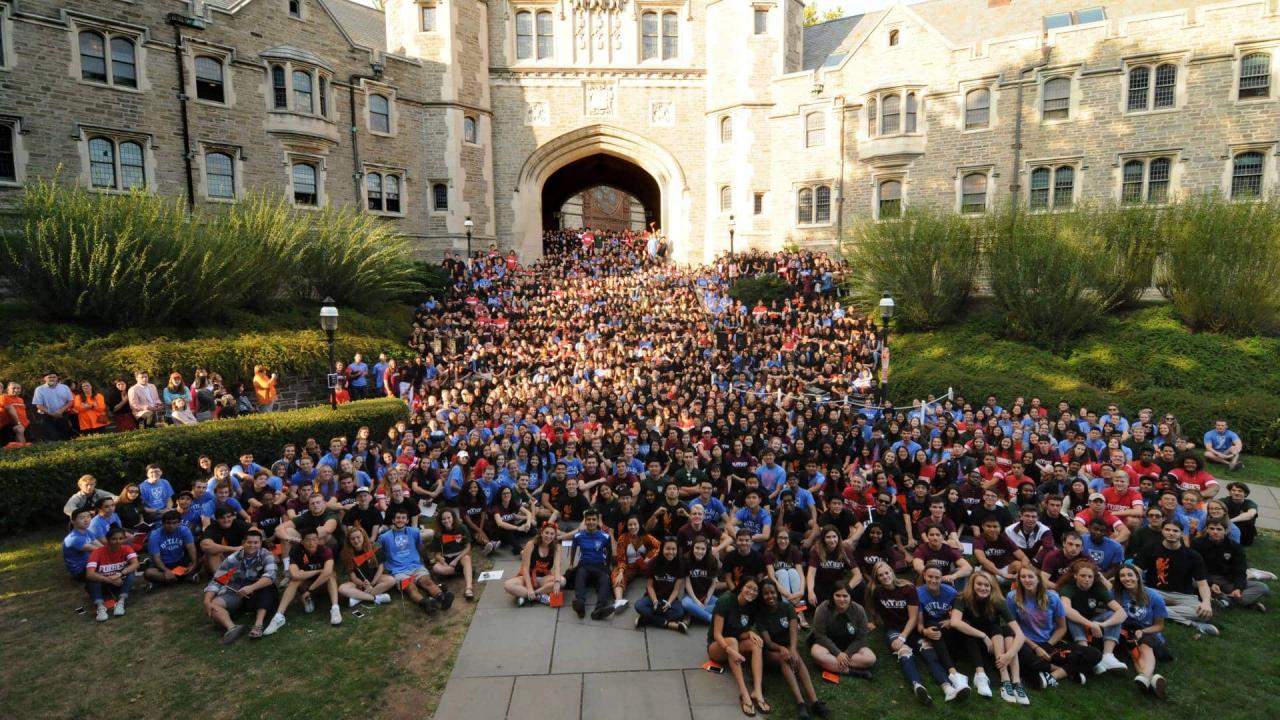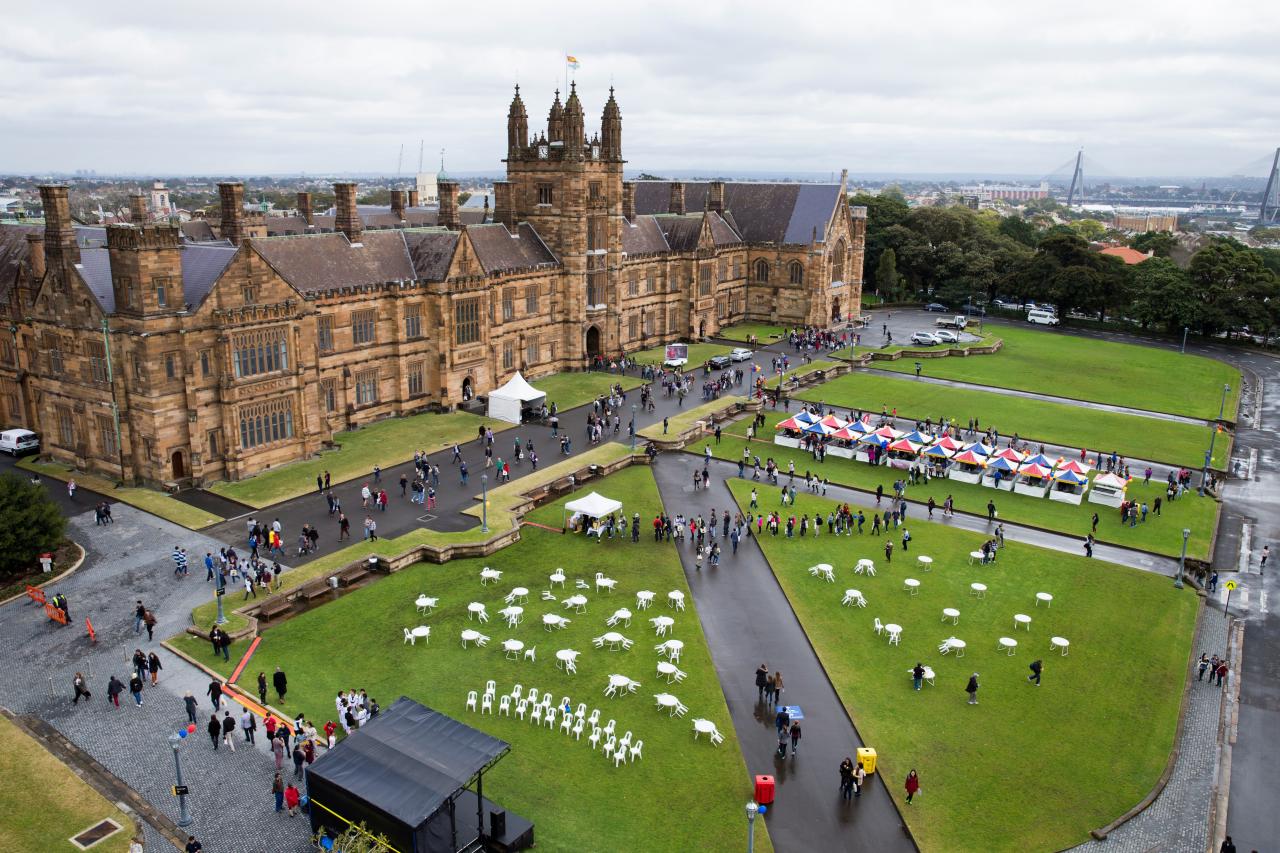News University sets the stage for a captivating narrative, offering readers a glimpse into a revolution in journalism education. This new model emerges as a response to the evolving media landscape, challenging traditional approaches and embracing innovative methods to prepare the next generation of journalists for the digital age.
News University is more than just a new name; it represents a fundamental shift in how journalism is taught and practiced. It embraces the dynamism of the digital world, incorporating emerging technologies, data-driven storytelling, and a focus on ethical and responsible news practices. The curriculum is designed to equip students with the skills they need to thrive in a rapidly changing media landscape, where traditional boundaries are blurring and new opportunities are constantly emerging.
Faculty and Expertise: News University
News University boasts a distinguished faculty composed of seasoned journalists, industry veterans, and academic experts, all dedicated to fostering the next generation of media professionals. These educators bring a wealth of practical experience, theoretical knowledge, and innovative approaches to the classroom, ensuring students receive a comprehensive and cutting-edge education.
Attracting and Retaining Experienced Professionals
News University actively seeks out experienced journalists and industry professionals to join its faculty. The university understands the importance of practical experience and real-world knowledge in shaping a successful media career. To attract these individuals, News University offers competitive salaries, flexible work arrangements, and opportunities for professional development.
The university also prioritizes fostering a supportive and collaborative environment for its faculty members. This includes providing access to state-of-the-art facilities, research grants, and opportunities to engage in cutting-edge research projects.
Research and Innovation
Research and innovation are integral to News University’s commitment to excellence in media education. Faculty members are encouraged to engage in research projects that explore emerging trends in media, technology, and society. This research not only contributes to the advancement of knowledge but also informs the curriculum and ensures that students are equipped with the latest skills and insights.
“The faculty at News University is at the forefront of media research and innovation. They are constantly exploring new ways to engage students and prepare them for the challenges of the evolving media landscape.” – Dr. Sarah Jones, Dean of the School of Journalism
Student Experience

At News University, we believe in fostering a dynamic learning environment that prepares students for the evolving landscape of journalism. Our unique approach blends theoretical knowledge with hands-on experience, equipping students with the skills and confidence to thrive in the industry.
Real-World Learning
Our curriculum is designed to provide students with practical experience through a variety of real-world opportunities.
- Internships: We have strong partnerships with leading media organizations, providing students with valuable internship opportunities. These internships allow students to apply their classroom knowledge in real-world settings, gaining practical experience and building their professional networks.
- Industry Projects: Students engage in collaborative projects with industry partners, working on real-world assignments that address current media challenges. This hands-on approach allows them to develop their problem-solving skills, learn from industry experts, and contribute to meaningful projects.
Technology and Innovation
News University is at the forefront of integrating technology and innovation into the learning experience.
- Digital Storytelling: Students are trained in cutting-edge digital storytelling techniques, using multimedia platforms to create engaging and impactful content. They learn to utilize various tools and technologies, including video editing software, social media platforms, and interactive data visualization tools.
- Data Journalism: We equip students with the skills to analyze and interpret data, transforming complex information into compelling narratives. They learn to use data visualization tools and statistical analysis techniques to uncover trends and present data-driven insights.
- Emerging Technologies: Students explore emerging technologies like artificial intelligence, virtual reality, and augmented reality, understanding their potential impact on the future of journalism. They gain insights into how these technologies can be utilized for reporting, storytelling, and audience engagement.
Career Trajectories
News University graduates are highly sought after by media organizations, demonstrating their readiness for the demanding world of journalism.
- Career Support: We offer dedicated career services, providing guidance and support to students throughout their journey. This includes resume and portfolio development, interview preparation, and networking opportunities.
- Alumni Network: Our robust alumni network connects students with experienced professionals in the field, offering mentorship, career advice, and valuable connections.
Challenges and Opportunities

News University faces both challenges and opportunities as it navigates the future of journalism education in a rapidly changing media landscape. It must adapt to evolving technologies, changing audience expectations, and the rise of new media platforms while simultaneously preparing students for a diverse and demanding industry.
Challenges Faced by News University
News University, like other journalism schools, faces several challenges in adapting to the evolving media environment. These challenges include:
- Keeping pace with technological advancements: The rapid pace of technological change presents a significant challenge for journalism education. News University must ensure its curriculum and resources stay current with emerging technologies, such as artificial intelligence, virtual reality, and data journalism. This includes providing students with access to cutting-edge tools and training them in the latest techniques for producing and consuming news.
- Meeting the demands of a changing news landscape: The rise of digital media, social media, and citizen journalism has significantly altered the way news is produced, consumed, and disseminated. News University must adapt its curriculum to prepare students for this new environment, emphasizing skills like digital storytelling, social media engagement, and data analysis.
- Preparing students for a diverse and competitive job market: The journalism industry is becoming increasingly competitive, with traditional media outlets facing financial challenges and new media platforms emerging. News University must equip students with the skills and knowledge necessary to thrive in this environment, including entrepreneurship, multimedia production, and a deep understanding of different media platforms.
Opportunities Presented by News University
Despite the challenges, News University also enjoys several opportunities to shape the future of journalism education. These opportunities include:
- Leading the way in innovation: News University can become a leader in developing innovative teaching methods and curriculum that prepare students for the challenges of the future. This includes embracing new technologies, experimenting with different learning formats, and fostering a culture of experimentation and innovation.
- Promoting ethical and responsible journalism: As the media landscape becomes increasingly complex, the importance of ethical and responsible journalism becomes paramount. News University can play a vital role in shaping the future of journalism by emphasizing ethical principles, media literacy, and critical thinking skills.
- Building a diverse and inclusive community: News University can create a welcoming and inclusive environment for students from diverse backgrounds and perspectives. This includes fostering a culture of respect, encouraging open dialogue, and promoting diversity in faculty and curriculum.
Comparing News University to Traditional Journalism Programs
| Feature | News University | Traditional Journalism Programs |
|---|---|---|
| Curriculum | Focuses on digital media, data journalism, and emerging technologies. | Traditionally emphasizes print journalism, broadcast journalism, and traditional reporting techniques. |
| Learning Environment | Offers a more flexible and collaborative learning environment, often incorporating online learning and hands-on projects. | Typically follows a more structured and lecture-based approach, with a focus on traditional journalism practices. |
| Career Preparation | Prepares students for a diverse range of careers in journalism, including digital media, social media, and data analysis. | Often focuses on preparing students for traditional journalism roles in print, broadcast, and online media. |
| Cost | May be more affordable than traditional journalism programs, especially with the rise of online learning options. | Can be expensive, with tuition fees and other expenses adding up quickly. |
The Role of Technology in News University
News University embraces technology to create an immersive and dynamic learning environment, preparing students for the evolving landscape of digital journalism. This integration of technology is not just about keeping pace with the times; it’s about equipping students with the skills and tools they need to excel in a rapidly changing media landscape.
Technology in News University
The use of technology in News University is not merely a trend; it’s an essential part of the curriculum. Students engage with various technologies to enhance their learning experience and prepare for the digital news environment.
- Virtual Reality (VR): VR allows students to experience news events firsthand, immersing them in different locations and situations. This immersive technology can be used to simulate newsgathering in conflict zones, natural disasters, or even historical events, providing a unique perspective and a deeper understanding of the context. For example, students could use VR to experience the aftermath of a hurricane or witness a political rally from the perspective of a participant.
- Augmented Reality (AR): AR overlays digital information onto the real world, enriching the learning experience. Students can use AR to explore news stories in a more interactive way. Imagine students using AR to view historical footage overlaid on the actual location where the event occurred, or to access real-time data on a news story through their mobile devices.
- Data Visualization Tools: Data visualization tools allow students to analyze and present complex data in a clear and engaging way. Students learn to use these tools to create interactive charts, graphs, and maps that help them tell data-driven stories. This skill is crucial for journalists today, who are increasingly expected to understand and communicate data effectively. For instance, students could use these tools to visualize the spread of misinformation on social media or to analyze the impact of a policy on different demographics.
Benefits of Technology in News Education
The use of technology in News University offers several benefits for students, preparing them for the challenges and opportunities of the digital news environment.
- Enhanced Learning Experience: Technology provides a more engaging and interactive learning experience, making the process more enjoyable and effective. For instance, using VR to experience a news event firsthand can be more impactful than reading a written report.
- Development of Essential Skills: Technology equips students with essential skills for the digital news environment, such as data analysis, visual storytelling, and digital media production. These skills are in high demand in today’s media landscape.
- Preparation for the Future: Technology helps students adapt to the evolving media landscape, where news consumption is increasingly digital and interactive. They learn to create and consume news in a dynamic and multimedia environment.
Ethical Implications of Technology in News Education
While technology offers numerous benefits, it’s crucial to consider the ethical implications of its use in news education.
“Technology can be a powerful tool for good, but it can also be misused. It’s important to teach students about the ethical considerations of using technology in journalism.”
- Data Privacy and Security: Students must be taught about the importance of data privacy and security, especially when working with sensitive information or using data visualization tools. They need to understand the ethical implications of collecting and using personal data.
- Objectivity and Accuracy: Technology can be used to manipulate information or create misleading content. Students need to be trained in critical thinking and media literacy to ensure the accuracy and objectivity of their work.
- Responsible Use of Artificial Intelligence (AI): AI tools are increasingly used in journalism, but they raise ethical concerns about bias, transparency, and accountability. Students need to be aware of these issues and learn to use AI responsibly.
The Importance of Diversity and Inclusion in News University
News University recognizes that a diverse and inclusive environment is crucial for fostering a dynamic and relevant news ecosystem. It’s not just about representation; it’s about ensuring that all voices are heard and valued, contributing to a richer understanding of the world.
Strategies for Promoting Diversity and Inclusion
News University actively works to create a welcoming and equitable learning environment for all students and faculty. Here are some of the strategies employed:
- Recruitment and Admissions: News University prioritizes attracting students from diverse backgrounds, including underrepresented minorities, individuals with disabilities, and those from different socioeconomic backgrounds. They actively reach out to diverse communities through outreach programs, scholarships, and mentorship initiatives.
- Faculty Diversity: The university actively seeks out faculty members who represent a broad range of backgrounds, experiences, and perspectives. They actively participate in professional organizations that promote diversity in academia, and they offer mentoring programs to support diverse faculty members.
- Curriculum Development: News University’s curriculum is designed to reflect the diverse perspectives and experiences of its students. They include courses that explore issues of race, gender, class, and other forms of social inequality in the context of news and media.
- Inclusive Learning Environment: The university fosters an inclusive learning environment where all students feel safe and respected. They implement policies and practices that promote inclusivity, such as sensitivity training for faculty and staff, and they provide resources for students who may be experiencing discrimination or harassment.
- Student Organizations: News University supports student organizations that focus on diversity and inclusion, such as organizations for students of color, LGBTQ+ students, and students with disabilities. These organizations provide a space for students to connect with others who share similar identities and experiences, and to advocate for greater diversity and inclusion on campus.
Representing Diverse Voices and Perspectives
Diversity and inclusion are not just about numbers; they are about ensuring that different voices and perspectives are represented in the news. This means:
- Challenging Dominant Narratives: News University encourages students to critically examine dominant narratives in the news and to explore alternative perspectives. This helps to ensure that the news reflects the full complexity of the world, rather than just a narrow range of views.
- Providing a Platform for Underrepresented Voices: The university creates opportunities for students from underrepresented backgrounds to share their stories and perspectives. This could include through student-led publications, community outreach initiatives, or multimedia projects.
- Cultivating Cultural Sensitivity: News University emphasizes the importance of cultural sensitivity and understanding in news reporting. They teach students about the importance of representing diverse communities with respect and accuracy.
Fostering a More Equitable and Inclusive Media Landscape
News University plays a vital role in shaping the future of the news industry. By prioritizing diversity and inclusion, they are:
- Preparing Students for a Changing Media Landscape: The news industry is becoming increasingly diverse, and News University is preparing its students to work in this evolving environment. They equip students with the skills and knowledge they need to engage with diverse audiences and to report on a wide range of issues.
- Creating a More Equitable and Inclusive Media Landscape: By promoting diversity and inclusion in news education, News University is contributing to a more equitable and inclusive media landscape. This means that news will be more representative of the diverse communities it serves, and it will be more likely to reflect the full range of human experiences.
The Future of News University
News University, a beacon of journalistic excellence, is poised for an exciting future, driven by the relentless evolution of the media landscape. As technology reshapes the way we consume and produce news, News University must adapt and innovate to remain at the forefront of journalism education.
The Role of Ongoing Research and Innovation
The future of News University is inextricably linked to ongoing research and innovation. The institution must actively engage in research that addresses emerging trends in journalism, such as the rise of artificial intelligence (AI) and the impact of social media on news consumption. This research will provide valuable insights into the challenges and opportunities facing the industry, informing the development of new curricula, teaching methods, and technologies.
Future Initiatives and Programs
News University should proactively implement new initiatives and programs to prepare students for the evolving media landscape. These initiatives could include:
- Specialized Tracks in Data Journalism and AI-Powered Reporting: The integration of data and AI into journalism is rapidly transforming the field. News University should offer specialized tracks in data journalism and AI-powered reporting, equipping students with the skills and knowledge necessary to leverage these technologies effectively.
- Immersive Virtual Reality (VR) and Augmented Reality (AR) Journalism Labs: VR and AR technologies are creating new avenues for immersive storytelling and interactive news experiences. News University should establish VR and AR journalism labs, providing students with hands-on experience in developing and delivering innovative news formats.
- Ethical Considerations in AI and Social Media Journalism: The use of AI and social media in journalism raises important ethical questions. News University should incorporate courses and workshops on the ethical implications of these technologies, fostering responsible and ethical practices among future journalists.
- Cross-Platform Storytelling and Content Creation: Journalists today need to be proficient in creating content for multiple platforms, including websites, social media, podcasts, and video. News University should offer programs that focus on cross-platform storytelling and content creation, enabling students to reach diverse audiences effectively.
News University: A Global Perspective
News University programs are emerging worldwide, reflecting the growing need for journalism education and training. These programs cater to diverse needs and contexts, offering unique approaches to journalism education and training.
News University Initiatives Across Different Countries and Regions
News University initiatives vary significantly across different countries and regions, reflecting local contexts, needs, and priorities. Here are some examples:
- In the United States, many universities offer traditional journalism programs, while others focus on digital media and multimedia storytelling. These programs often incorporate practical experience through internships and student-run media outlets.
- In Europe, News University programs often emphasize critical thinking, media ethics, and cross-cultural understanding. They also promote collaboration and exchange between universities across borders.
- In Asia, News University programs are increasingly focusing on digital journalism, social media, and mobile reporting. They also address the challenges of reporting in diverse cultural and political environments.
- In Africa, News University programs are often driven by the need to develop local journalism capacity and address issues of poverty, conflict, and development.
Challenges and Opportunities of Developing News University Programs in Diverse Cultural Contexts
Developing News University programs in diverse cultural contexts presents both challenges and opportunities. Here are some key considerations:
- Language Barriers: Overcoming language barriers is essential for effective communication and collaboration. News University programs should consider offering courses in multiple languages or providing translation services.
- Cultural Sensitivity: Journalism ethics and practices can vary significantly across cultures. News University programs should be sensitive to local cultural norms and values, while also promoting ethical and responsible journalism.
- Access to Technology: Access to technology is crucial for digital journalism education. News University programs should consider providing access to technology and training for students from diverse backgrounds.
- Funding and Resources: Developing and maintaining News University programs requires significant financial resources. Universities should explore various funding sources, including government grants, private donations, and partnerships with media organizations.
Potential for International Collaboration and Knowledge Sharing Among News University Institutions
International collaboration and knowledge sharing are essential for fostering innovation and excellence in journalism education. Here are some ways News University institutions can collaborate:
- Joint Research Projects: News University institutions can collaborate on research projects exploring global trends in journalism, media ethics, and digital storytelling.
- Faculty Exchange Programs: Exchange programs can enable faculty members to share expertise and best practices across institutions.
- Student Exchange Programs: Student exchange programs can provide opportunities for students to learn from different cultural perspectives and develop global networks.
- Online Learning Platforms: Online learning platforms can facilitate access to global resources and connect students and faculty from different countries.
News University is not merely an educational institution; it’s a movement that is shaping the future of journalism. By fostering a culture of innovation, collaboration, and ethical practice, it empowers students to become agents of change, contributing to a more informed and engaged public. As the media landscape continues to evolve, News University remains at the forefront, providing a platform for the next generation of journalists to shape the future of news and information.
News from universities keeps us informed about cutting-edge research, groundbreaking discoveries, and the latest developments in various fields. A prime example is columbia university news , which covers a wide range of topics, from the humanities to the sciences, and provides insights into the innovative work being done at this prestigious institution. News from universities like Columbia serves as a valuable resource for students, researchers, and the general public, keeping everyone connected to the ever-evolving world of academia.
News from universities can cover a wide range of topics, from research breakthroughs to student life. Brown University, for example, often makes headlines with its innovative academic programs and commitment to social justice. You can find the latest news from Brown University on their dedicated website, brown university news , which offers insights into the university’s current events, research findings, and upcoming events.






